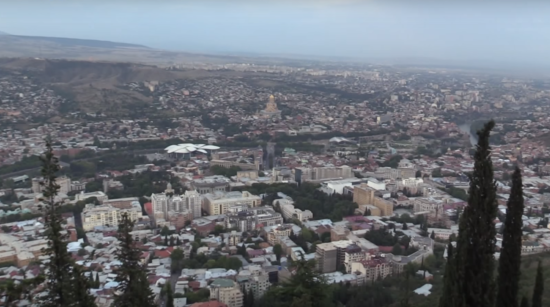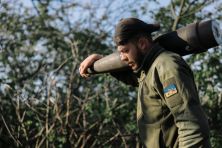Leila brought the cheese for this hachapuri from her native village of Akhalgori. The settlement was occupied in 2008. The woman seldom crosses the demarcation line to visit her sister, who remains in the so-called Republic of South Ossetia.
Leila told us that her family had a 2-storey house in the occupied territory, a vegetable garden, as well as some cows and sheep. They had to leave it all.
The Midelashvili family lives in a settlement for displaced persons in Tserovani. Leila’s husband Avtandil works as a gardener for the local mayor’s office, he takes care of parks. His salary is monthly 200 lari, that’s around 80 dollars. The 5-day war between Russia and Georgia didn’t only cost them a house. It took their son. 19-year-old Levan had served in the Georgian 4th mechanized infantry brigade.
Avtandil recalls that the first news about the shelling of Tskhinvali started to come in around midnight. Georgian president Mikheil Saakashvili launched a military operation against separatists in South Ossettia.
The fact that the situation in the region was escalating was evident at the beginning of summer, recalls Georgian journalist Temur Kiguradze. According to him, there were already skirmishes between South Ossetian formations and Georgian policemen. Russian peacekeepers were present on the territory of South Ossetia. But, despite this, the separatists still used large-caliber weapons. Temur and three other journalists entered Tskhinvali on Aug. 8 when the fighting was in full swing. They thought that the city was under the control of the Georgian military.
Two journalists died, Temur and one of his colleagues was injured. They were interrogated and tortured. When the captors found their press cards, Temur and his team were sent to the basement of a Tskhinvali hospital. Then they were convoyed to Vladikavkaz, Russia.
In the middle of August, Temur managed to return home thanks to the help of international organizations and his own colleagues. Russia moved its forces into South Ossetia in an operation in Tshinvali Region aimed at “pacifying” Georgia. The pretense: the Georgian military had allegedly injured Russian peacekeepers and civilians.
Active hostilities lasted for 5 days. 180 Georgian soldiers were killed. More than 25 thousand people had to flee their homes. The Midelashvilis searched for their son for 4 months. They hoped he was alive, maybe captive, until the very end. His body was identified through a DNA test.
19-year-old Levan was posthumously awarded the medal of honor and the order of Vakhtang Gorgasali. A monument in his honor was erected in Tserovani, where his family currently resides.













